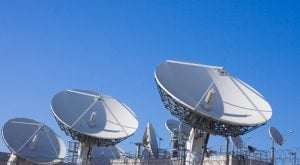The growing demand for satellite-based services, such as Earth observation, communication, and navigation, has also created significant opportunities in the space industry. I think that we’ve only just started to see the future diversity present with numerous firms entering the space race.
The good thing about space stocks is that they operate in cyclical, and often diversified industries as well, compassing sectors that range from industrials through to defense, which can act as an inbuilt hedge against the speculative nature of industry.
So here are three space stocks to buy in April for investors.
Boeing (BA)

I’ll start by sharing what I think is a potentially unpopular and contrarian pick, Boeing (NYSE:BA), which plays a significant role in the aerospace sector, especially with its contributions to NASA’s CST-100 Starliner project for the ISS.
It has a fareaching portfolio, including the development and deployment of satellites through its Defense, Space & Security division. It reported revenue of about $25 billion in 2023 for this segment, from its $77 billion in total.
BA trades at new yearly lows, at $174 at the time of writing. Boeing faces growing scrutiny, with the FAA announcing further investigations amid existing federal probes and upcoming Senate subcommittee hearings.
I think that the saga is far from over, and that bad news will continue to roll in, which will further hammer its stock price. The bull case though is that I feel that it will work through its kinks, and that this is ultimately a flurry of short-term news that presents a contrarian buying opportunity. At present, according to discount cash flow (DCF) analysis, it trades below its fair value, and once the media frenzy is over and safety concerns have be allayed, airlines will continue its business as usual with BA, thus making it undervalued at the time of writing.
Virgin Galactic (SPCE)

Virgin Galactic (NYSE:SPCE) focuses on space tourism, offering suborbital flights for civilians.
I think there’s some good reasons to feel bullish about SPCE. This year, it embarked on its 11th mission, known as ‘Galactic 06’, which is significant as all four seats aboard VSS Unity were occupied by private astronauts.
SPCE is also developing its next-generation Delta-class ships, aiming to expand flight capacity with testing expected to commence the following year and commercial service projected for 2026.
At around $1.1 per share, SPCE is indeed a speculative gamble on the space industry’s prospects, particularly in the space tourism sector. It’s a concentrated play that could warrant a small position of an investors’ portfolio to mitigate risk, but the upside is there for the taking.
Namely, SPCE’s EPS is forecasted to progressively increase to FY2028, which is when it’s expected to reach breakeven profitability, FY2026 is when its top-line is expected to reach a massive inflection point, growing to 122.73 million.
If one has a positive thesis on the space tourism industry, then SPCE could be a way to capitalize on it due to its low valuation and strong growth prospects.
EchoStar Corporation (SATS)

EchoStar Corporation (NASDAQ:SATS) provides satellite communication solutions, serving both consumer and enterprise clients across the Americas.
I feel that SATS is a much less speculative play than BA or SPCE given its established commercial operations and its recent merger with the DISH corporation. However, successfully unlocking value from the assets held by DISH will take some time, but I’m firmly convinced that it will be able to find synergies and further improve shareholder equity.
This move is designed to optimize SATS’s resource allocation for its goal of becoming a top provider of terrestrial mobile, satellite connectivity, and content services.
Analysts are firmly bullish on SAT’s prospects over the next twelve months, with a predicted upside of 63.81%. However, its revenue growth and top-line is expected to be negative for the next few years while it unlocks value from the DISH merger, but significant synergies are expected post FY2026, for both revenue growth and its EPS.
On the date of publication, Matthew Farley did not have (either directly or indirectly) any positions in the securities mentioned in this article. The opinions expressed are those of the writer, subject to the InvestorPlace.com Publishing Guidelines.
Matthew started writing coverage of the financial markets during the crypto boom of 2017 and was also a team member of several fintech startups. He then started writing about Australian and U.S. equities for various publications. His work has appeared in MarketBeat, FXStreet, Cryptoslate, Seeking Alpha, and the New Scientist magazine, among others.
